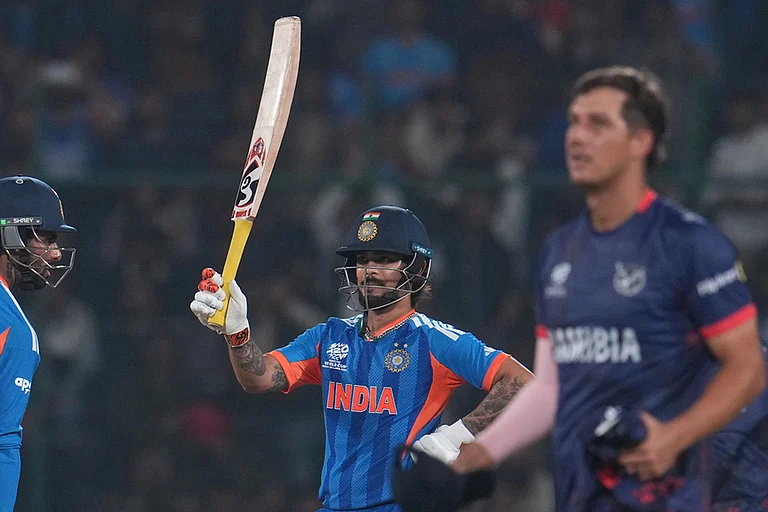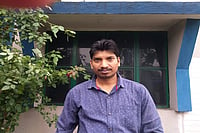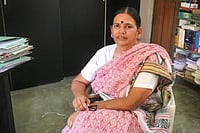On the night of April 26, 2021, Irtiza Qureshi, 35, received an #SOS Alert on one of the Covid Help WhatsApp groups. “URGENT : A family in Burari needs help. Nobody is stepping up to help the son cremate his dead parents,” it said.
Laxman Tiwari, a resident of Burari, Delhi, will never forget that date. Covid had hit the entire family, leaving his wife hospitalized and his old parents in critical condition. Laxman is home quarantined with a 4-year-old son. Around 4 pm on April 26, his mother started struggling for breath as her support system began to run out of oxygen. After an hour of gasping, frantic wheezing, palpitating and relentless pumping by the son, she was gone. The horror had just begun.
Barely a few hours later, before he could come to terms with the loss, Laxman’s father was also gasping for oxygen. The desperate son now started pumping his father’s chest. But around 1 in the morning, his father too breathed his last. Appalled and shattered, and withdrawn from reality, Laxman and his young son stared at the dead bodies of their loved ones. After around an hour, Laxman gathered himself and reached out to the neighbours for help. Fearing for their own lives, no one stepped up. Perhaps it was one of them that sent out that WhatsApp alert.
A Covid volunteer, Irtiza rushed out to help Laxman. It was 4 in the morning when he reached Burari police station, and begged and pleaded for help to take the bodies to the cremation ground, less than 4 km from Laxman’s house. “We have no such facility. Call 102 or 112,” the policemen there tell him. He calls 102 and receives a reply, “We don’t have any arrangement for bodies of Covid patients. We only handle the cases of live patients.” On trying 112, he gets some ‘valuable’ advice: “Why don’t you try JustDial and get the numbers?”
Still at the police station, Irtiza decides to do just that, and starts reaching out to the outfits listed in the search results one by one. Finally, one of the companies listed agrees to provide the service. But with several non-negotiable conditions. One, the bodies would be left on the road outside the crematorium. Two, no assistance would be provided in bringing the bodies to the ambulance. The driver would not touch the bodies. And for all this, the company would charge Rs 8,000. But not only can the family not afford that amount, the father and young son are not in any shape to carry the bodies of their loved ones –which have started to decompose in the heat-- without help.
After exhausting all the options on Just Dial, Irtiza again pleads with the police. There is a four-year-old kid with a Covid positive father, and the bodies of their family members are decaying in front of their eyes, he says. “We cannot help,” shrugs the assistant sub-inspector of police at the station. “You should go and inquire at the cremation ground. They might send an ambulance,” he suggests helpfully.
It’s 7 am, and Irtiza rushes to the NigamBodh Ghat and walks to the Covid section there. “Opens at 10 am” says a sign there. Irtiza cannot afford to wait. The bodies have already started to decompose, and any further delay could be very injurious to the health of both the father and the son. He finds an ambulance agent outside the ghat, and after much begging and pleading, the agent agrees to send two men to assist, but they too would leave the bodies on the road outside the crematorium. And they would not help with the cremation. His fees? Rs 25,000. It is impossible for the family which is already struggling with finances.
“If people fear for their lives, they should not step out of their houses,” muses Irtiza later in a conversation with this correspondent. “But there were people coming out to work. And what did they choose to do? Profit from the plight of others.”
While standing at the entrance of the Nigam Bodh ghat trying to figure out next steps, Irtiza receives multiple calls from a distraught Laxman, sobbing and crying over the horror of watching the bodies of his parents decompose in the heat, and afraid for what these images would do to his son.
Around 8 am, Irtiza tweets and tags DCP North Delhi, demanding immediate help. He also reaches out to Farhan Yahya, journalist who runs Hindustan Live, a news portal. Farhan immediately decides to reach out to the DCP, SHO, Inspectors and other officials before all the hells break loose. He then starts live reporting of the issue on Facebook. He calls the DCP and SHO Burari on Bluetooth speakers, seeking help. He tells the officers that the entire city is listening to them right now. Eventually, all the police officers promise to help. “I have been trying many ambulances. I am even ready to pay from my pocket. But nobody is coming,” laments the Burari SHO. Farhan again calls 112 and tells the operator that he is being broadcast live. The operator finally agrees to send an ambulance.
Irtiza and Farhan wait till 10:30 am before calling 112 again to enquire about the status of the ambulance. It has been more than 17 hours since Laxman’s mother died and as the temperature rises, the smell of rotting flesh becomes overpowering. Iritza is reassured by the helpline that the ambulance is about to reach. But it doesn’t.
Meanwhile, Irtiza also receives some calls from the police station. They ask him about his address and other personal details. When he asks why, the policeman tells him that it is mandatory because the DCP, SHO and the big officers got a call from his number. The interrogation and intimidation forces Irtiza to leave, but he is in constant touch with other NGOs. Some of them tried to reach out to the MLA in Burari district, who finally could arrange an ambulance after another five hours.
After 22 hours of absolute misery and despair, Laxman’s parents finally get a ‘respectful’ farewell. Irtiza was told the bodies were in extremely bad shape when they were finally loaded into the ambulance.
The sight of a four-year-old staring at the decaying corpses of his grandparents for almost a day while his father begs and pleads with neighbours and strangers for help is nothing but a slur on humanity.
They evoke memories of the childhood tales that grandma told us about hell, where the dead outnumber the living. Where death visits us every day, where corpses are piled one above another, where there are pyres burning as far as one can see. Where children sleep in coffins, and playgrounds turn into burial grounds. Where people die gasping for air.
Except they are no longer fables. Welcome to Delhi. Welcome to Hell.


























